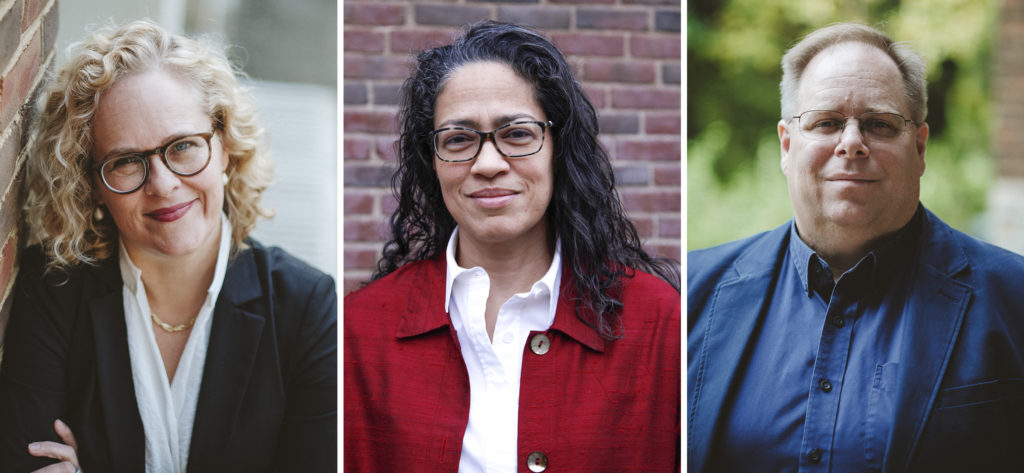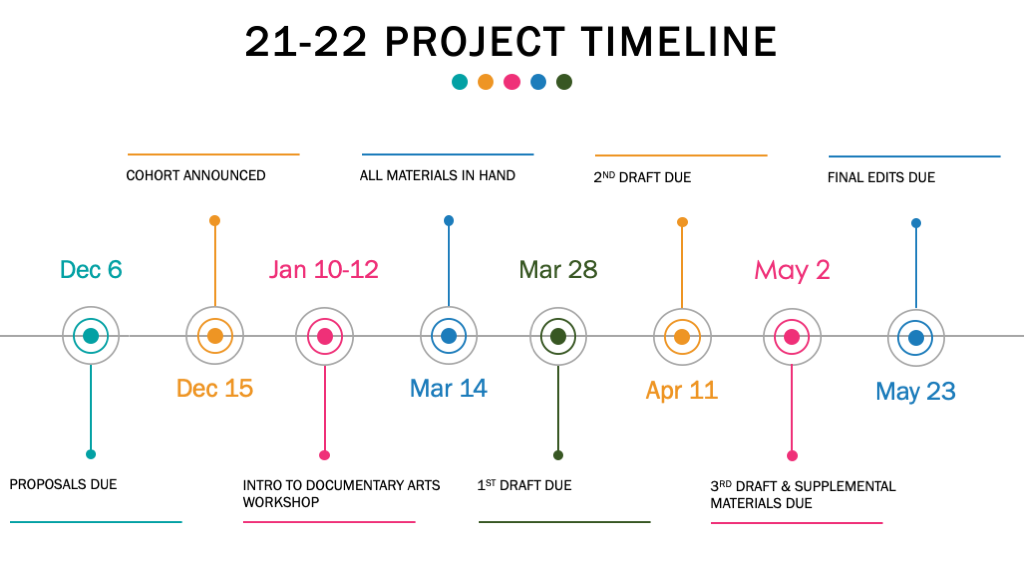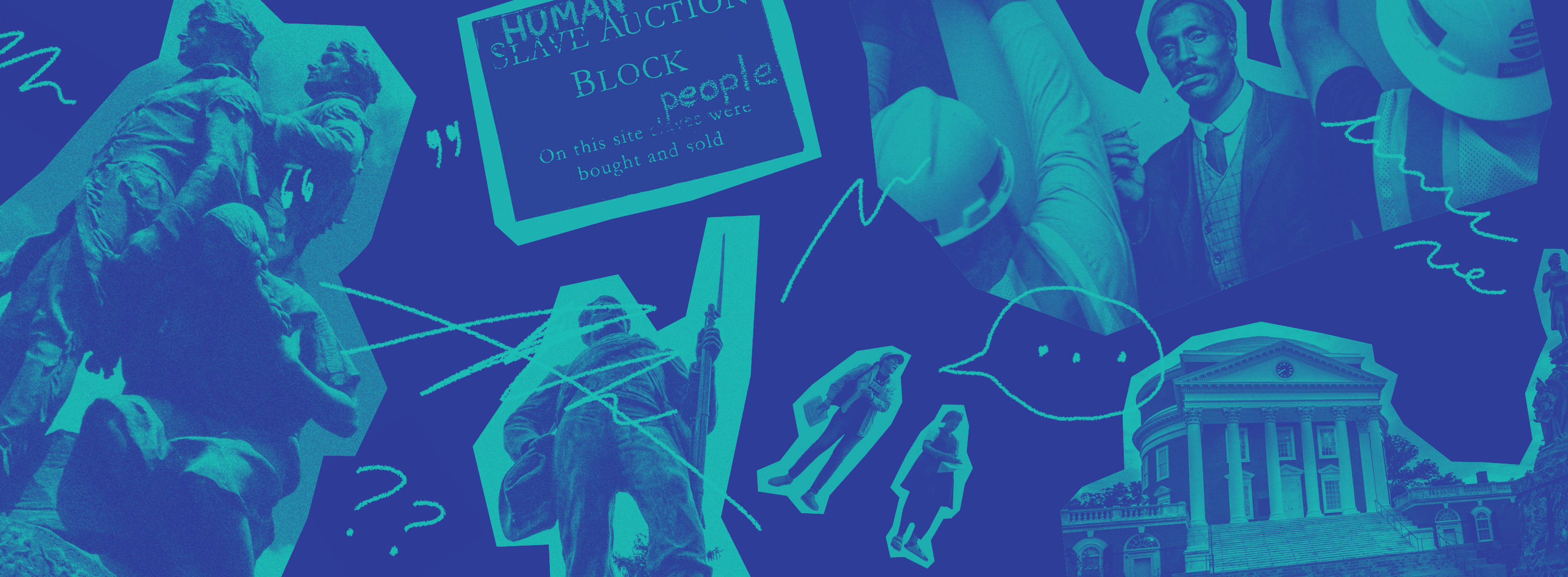New Extended Deadline: April 4, 2022, 11:59 PM EST
Details
- Stipend: $2,000, plus paid travel; recording equipment and books purchased for all participants
- Tenure: 7 months, June 9, 2022–mid-January, 2023, and includes:
- A 3-day virtual training workshop from June 9–11, 2022 called “Introduction to the Documentary Arts,” facilitated by UnionDocs Center for Documentary Art
- A week-long summer institute in Charlottesville, Virginia from June 13–17, 2022 to rethink “American religions” (including all contemporary traditions in the United States) via religion, race, and democracy
- The production of a short audio piece in the six months following the summer institute (see production timeline below)
- A virtual convening in January 2023 for participants to share their work and critically reflect on their research experiences
- Completed applications must be submitted through the online application form no later than 11:59 pm Eastern Standard Time, April 4, 2022
- Notifications will be sent via email by mid-April 2022
- Contact thereligionlab@virginia.edu with program inquiries
The University of Virginia’s Religion, Race & Democracy Lab and the Memory Project invites emerging and mid-career scholars of religious studies, and those in related humanities fields, from across the United States to collaborate with local scholars, artists, and journalists, for a summer institute in Charlottesville, Virginia, called Learning with Charlottesville: Narratives of Religion, Race & Democracy.
The institute seeks to prepare scholars to produce accessible scholarship that addresses urgent public questions about religion, race, and democracy. Using Charlottesville’s distant and more recent history as case studies and drawing on the work of local experts who have produced compelling public scholarship, the institute will train participants in both the art and techniques of producing public narratives on the relationships between religion, race, and justice in their own communities. In the six months to follow the summer institute, participants will produce a short-form audio piece inspired by a U.S. location of their choosing.
The Religion, Race & Democracy Lab and the Memory Project, affiliates of the College and Graduate School of Arts & Sciences’ Democracy Initiative, will collectively lead the project, with Professors Martien Halvorson-Taylor and Kurtis Schaeffer, co-directors of the Religion, Race & Democracy Lab, and Professor Jalane Schmidt, director of the Memory Project, steering the effort. The project leaders are all tenured members of UVA’s Department of Religious Studies, which is the largest at any public university in North America, and a national and international leader in its exploration of the role, and lived reality, of religion in public life.

(l-r) Professors Martien Halvorson-Taylor, Jalane Schmidt, and Kurtis Schaeffer
The project’s goals are:
- to train scholars who study any contemporary religious expression in the U.S. to be engaged as public intellectuals and become skilled in the documentary arts
- to shape the field of religious studies, making it more responsive to the dynamic between religion and racism in local and national contexts
- to create with the cohort a range of public-facing and well-researched short-form audio pieces on religion, race, and democracy in the U.S.
Audio production, as the Religion, Race & Democracy Lab’s work on the podcast Sacred & Profane has proven, offers an opportunity to make scholarship public in ways that extend beyond the typical venues for scholarly writing.
The summer institute will be held at Charlottesville’s Jefferson School African American Heritage Center (JSAAHC), an independent nonprofit organization dedicated to highlighting African American history and culture of the African diaspora, and UVA’s Morven Farm, a historic landscape ideally suited for interdisciplinary collaboration, research, and learning. A significant portion of participants’ time will be spent visiting local sites and symbols of historical importance, like Thomas Jefferson’s Monticello, Charlottesville and Albemarle County Courthouse Historic District, and UVA Grounds, to interrogate how memory, race, religion, and democracy are presented in public spaces.
The summer institute sessions will be led by guest lecturers across the fields of religious studies, history, politics, journalism, music, art, and art history, along with two professional audio producers, including:
- Niya Bates, PhD Candidate in History, Princeton University and former director of Monticello’s Getting Word African American Oral History Project
- Jamelle Bouie, New York Times opinion columnist and political analyst for CBS News
- Federico Cuatlacuatl, artist and Assistant Professor, Studio Art
- Andrea Douglas, PhD, Art History and Executive Director, Jefferson School African American Heritage Center
- Kevin Everson, artist/filmmaker and Professor, Studio Art
- Emily Gadek, senior producer, Religion, Race & Democracy Lab
- Bonnie Gordon, Associate Professor, Critical & Comparative Studies, Music
- Kelly Hardcastle Jones, freelance producer and editor, Religion, Race & Democracy Lab
- Claudrena Harold, Professor and Chair, African American and African Studies and History
- Larycia Hawkins, activist and Assistant Professor, Politics and Religious Studies
- John Mason, Associate Professor, History and Co-Director, Holsinger Portrait Project
- Charles Mathewes, Professor, Religious Studies
- Kai Parker, Assistant Professor, African American Religious History
- Kirt von Daacke, Assistant Dean and Professor, History
Participants will receive ongoing mentoring and production assistance from the Religion, Race & Democracy Lab’s co-directors and production staff in the months following the summer institute. Participants are expected to follow the below production schedule.

Eligibility
The Religion, Race & Democracy Lab and the Memory Project are seeking 20 participants for Learning with Charlottesville: Narratives of Religion, Race & Democracy.
Applicants must:
- Have a PhD, preferably in religion or religious studies, or a relevant field, like history or anthropology
- Have a research focus in religion, race and democracy in the U.S., inclusive of any contemporary religious expression in the U.S.
- Have an interest in storytelling and audio production (prior production experience is not required)
- Participate in both the online documentary arts workshop (June 9–11, 2022) and the in-person summer institute (June 13–17, 2022)
- Follow a production schedule in the six months after the summer institute to complete a short audio piece
- Participate in a virtual convening in January 2023 to share final work with the cohort and critically reflect on research experiences
- Follow UVA’s Coronavirus policies, which includes providing proof of vaccinations and boosters, masking, and social distancing indoors
Applicants are not required to hold a faculty position at a college or university.
Evaluation Criteria
- The applicant’s level of research and engagement with a topic on religion, race, and democracy in the U.S.
- The project’s capacity to advance public scholarship of “American religions” by addressing significant subjects at the intersection of religion, race, and democracy in the U.S.
- The feasibility of the project plans, including the ability to access story contributors.
- The project’s clarity about how a research topic can be translated into an engaging narrative for a public audience.
Application Requirements
Applications must contain the following components:
Project Pitch, in 3,000 characters or less. The project pitch must:
- address a big question or idea that touches upon all three themes: religion, race, and democracy in the U.S.; note: projects should be grounded in the U.S. but they can make connections to religious traditions in other parts of the world
- demonstrate that there is a compelling story to be told, by clearly stating the central question or conflict to be addressed around a specific time and place
- identify one potential interviewee for the project—for example: a scholar, community member, or any expert who can address the central topic
- identify the project location and the year or time period to be addressed by the project—for example: Tulsa, Oklahoma, 1921
- be written in clear, informal language that is free of academic and technical speak
Bibliography, Upload doc, docx, or pdf; no more than two pages, double-spaced, in Times New Roman 12-point font. The bibliography should reflect key scholarship from the fields and topics in which the project will intervene.
Short CV, Upload doc, docx, or pdf; no more than two pages single-spaced, in Times New Roman 12-point font.
Interviewee Statement, a screenshot of an email from a potential interviewee, which clearly states their willingness to be involved in the proposed project.
Apply Here
Frequently Asked Questions
Do I have to be a U.S. resident to apply?
No. If you are living in the U.S. during the Summer Institute and your project will treat a topic about religion, race, and democracy in the U.S. you are eligible to apply. We are not able to support international travel for participants.
Can two (or more) people apply together to produce a collaborative project?
No. We are only supporting projects proposed by individuals.
What time commitment is required of interviewees?
While each project is different, the Religion, Race & Democracy Lab typically averages 1 hour of total interview time when preparing a podcast episode, and this might be spread over 1-2 sessions. If there are several interviewees, then each session might be shorter.
Are there any audio pieces about religion, race, and democracy in the U.S. that help illustrate what the Summer Institute participants will produce?
Yes, we recommend listening to these episodes of Sacred & Profane:
What Would Krishna Do?, Season 1, Episode 3
Set Apart, Season 1, Episode 6
La Santa, Season 2, Episode 5
American Idols, Season 2, Episode 11



